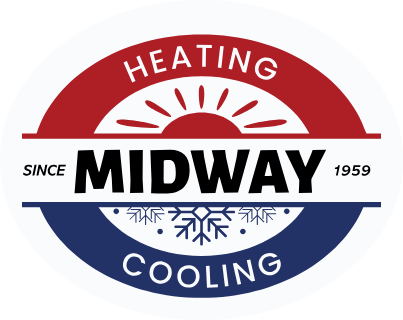When it becomes time to upgrade your old heating system, it’s important to review the available options. Two of the most common include a furnace and a heat pump. Knowing the differences between the two can help you determine which one will be an ideal fit for your home.
Furnaces
There are two main styles of furnaces: electric and fuel-burning. Electric furnaces are powered by electricity and have an internal heating element that warms up the air as it blows through your ductwork. This type of system operates at 100% efficiency but can be fairly expensive as it relies solely on electricity to function. On the other hand, fuel-burning furnaces can run on natural gas, propane, or heating oil. These furnaces have a flame that burns fuel to create heat for your home.
Standard efficiency furnaces operate at around 80% efficiency while high-efficiency furnaces operate in the 90% range. High-efficiency models are more expensive but are going to be cheaper to run over the long term. It’s also important to note that fuel-burning furnaces are going to have much cheaper operating costs than their electric counterpart.
Heat Pumps
Heat pumps rely on electricity to provide heat for your home. Unlike furnaces, heat pumps don’t actually create heat. Rather, they transport heat from one location to another. During the winter, a heat pump will pull heat out of the air outdoors and transport it inside your home to keep it nice and comfortable inside. Heat pumps are known to operate at efficiency levels up to 300% and 400%. Furthermore, heat pumps can transport heat from inside your home to the outdoors during the summer to keep it nice and cool inside.
It’s very important to note that most modern-day heat pumps are unable to continually operate efficiently when temperatures get below freezing. Some newer heat pump technology is starting to come out that can allow heat pumps to operate below this temperature point, but they aren’t as widely available as traditional heat pumps. When temperatures get too cold, traditional heat pumps will have an internal heating element much like an electric furnace. It will heat the air via this electric heating element to keep your home warm until the temperatures outside come back above freezing when it can return to its normal operation. When a heat pump is using this auxiliary heating mode, it’s much less efficient than normal.
Upfront Investment
One of the most important things that people take into consideration on purchasing a new heating system for their home is the upfront cost of doing so. In general, furnaces will be much cheaper to purchase than a heat pump system. Electric furnaces tend to be the cheapest to buy. If you don’t already have a fuel line set up for your furnace, then you can expect to pay more in labor for a fuel-burning furnace as opposed to an electric one.
Heat pumps typically cost around two times what a furnace will. However, heat pumps make you eligible to receive a federal tax rebate that can help you recoup some of the initial investment costs for your heat pump. It’s also important to note that some high-efficiency furnaces can also make you eligible to receive a federal tax incentive. It’s best to talk with one of our HVAC technicians to get a free estimate.
A Note on Ductwork
When discussing furnaces and heat pumps, it’s crucial to mention that a furnace only works in a forced-air heating setup. You need to have ductwork running throughout all the rooms of your home in order to deliver an adequate amount of heat. While heat pumps can certainly work with traditional ductwork, they can also work without it. These are referred to as ductless mini-split systems and they allow you to have individual mini-split units in each room of your home. This is a great option for older homes that don’t have ductwork and for home additions.
Operating Costs
Apart from just the upfront purchase price of a new system, it’s important to understand what its operating costs will likely run. This way, you can ensure that your heating bills stay within your monthly budget. In general, the cheapest fuel to run is going to be natural gas. Unfortunately, this fuel is not available everywhere. Both propane and heating oil are going to be a little bit more expensive per unit than natural gas. However, they’re both going to be cheaper to run than electricity per unit.
While understanding what the price per unit is for each different type of fuel is important, it’s also necessary to understand how much fuel you’ll need to make your ultimate decision. For example, a heat pump runs on electricity, which is the most expensive. However, its high operating efficiency allows it to have a lower overall operating cost as compared to a propane-powered furnace. You’ll want to take into account both the cost of fuel per unit as well as the overall operating efficiency of your unit to determine the operating cost for the season.
Longevity
Another necessary comparison to make between a heat pump and a furnace is their overall lifespan. A heat pump will have a lifespan of around 10 to 15 years. A furnace that burns heating oil, natural gas, or propane is going to have a lifespan of around 15 years. However, a furnace that runs on electricity will have a lifespan of up to 30 years. It’s also crucial to know that the overall lifespan of your furnace or heat pump will highly depend on the amount of maintenance and care that it receives.
A Note on Using Both
It’s important to keep in mind that both furnaces and heat pumps can provide benefits for homeowners. A heat pump not only provides very efficient heating down to freezing temperatures but it also provides you with a home cooling system. A furnace is going to be the most effective heating system when temperatures dip down below freezing.
With all of this knowledge in mind, it’s easy to see that having both a furnace and a heat pump can provide you with maximal energy savings throughout the year when you live in a cold climate. You can rely on a heat pump to provide you with the most efficient heat when temperatures are above freezing. However, when temperatures drop alongside the efficiency of a heat pump, you can rely on a furnace to take over heating your home. Furthermore, you get the added benefit of having air conditioning during the summer months thanks to a heat pump.
Reliable Heating Installation Service
Midway Heating Company offers reliable heating installation service for the Portland, OR area. We can also assist with all your heating, air conditioning, commercial, indoor air quality, ductless mini-split, and heat pump needs. Contact us to schedule a consultation for your home heating and cooling needs.

